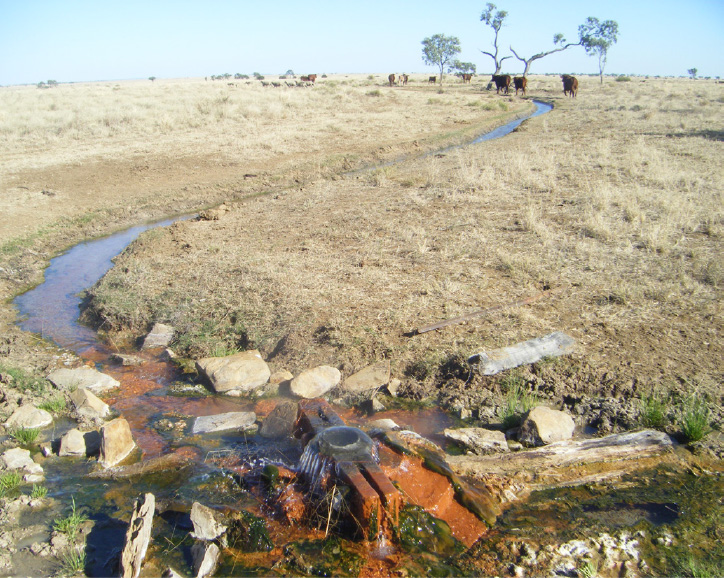Making the Great Artesian Basin watertight
We aim to make the Queensland section of the Great Artesian Basin (GAB) watertight to increase groundwater pressure and protect natural environments.
This involves managing water flow by rehabilitating or replacing bores, and replacing open bore drains with pipes, tanks and troughs.
The Great Artesian Basin and other regional aquifers (GABORA) water plan requires uncontrolled flowing bores to be controlled and bore drains replaced with controlled watering systems by September 2032. Water licence holders with bores that are not watertight by this time may be subject to compliance action.
For bore owners
Bore owners in the Queensland section of the GAB can apply for either:
- a water saving licence for at least 30% of water saved from privately funded (non-government funded) cap and pipe projects
- funding from GAB rehabilitation program for eligible cap and pipe projects.
You cannot apply for both.
Great Artesian Basin rehabilitation program (GABRP)
The GABRP replaces previous programs—the Great Artesian Basin Sustainability Initiative (GABSI) and the Interim Great Artesian Basin Infrastructure Investment Program (IGABIIP).
The following initiatives under GABRP are helping us reach our goal of making the GAB watertight by 2032.
GABWSP is administered by the Department of Regional Development, Manufacturing and Water. It co-funds water supply infrastructure projects that contribute to water security and sustainable management in the Basin.
For more information, email BPMO@rdmw.qld.gov.au.
GABIPP provides an opportunity for private investors to fund the rehabilitation of a bore on behalf of the bore owner, in exchange for community goodwill, environmental benefits or a tradeable water licence.
By funding the rehabilitation of a bore on behalf of the bore owner, investors can be part of one of the largest environmental remediation programs in Australian history.
To get involved, email BPMO@rdmw.qld.gov.au.
Updates and achievements
Programs to cap and pipe stock and domestic bores have been ongoing for decades. Significant investment has been made to achieve the objective of making the GAB watertight.
More than 775 bores have been rehabilitated and 450 bores piped. Around 15,000km of open drains have been decommissioned over the years. This has saved more than 228,000 megalitres of water with investment of over $243 million from the Australian and Queensland governments, industry and landholders.
Groundwater pressure is now increasing in the GAB allowing the re-emergence of natural springs and wetland ecosystems. These are important habitats for native wildlife and plants.
The updated GAB strategic management plan for 2019–2034 will improve the coordination of management practices across state boundaries and encourage water-efficient practices.

Also consider...
- Find out more about the Great Artesian Basin and other regional aquifers (GABORA) water plan.
- Learn about spring monitoring in the Great Artesian Basin.
- Read about national Great Artesian Basin water management.
- View the updated GAB strategic management plan for 2019–2034.
- Explore Queensland’s plan to protect our Great Artesian Basin.